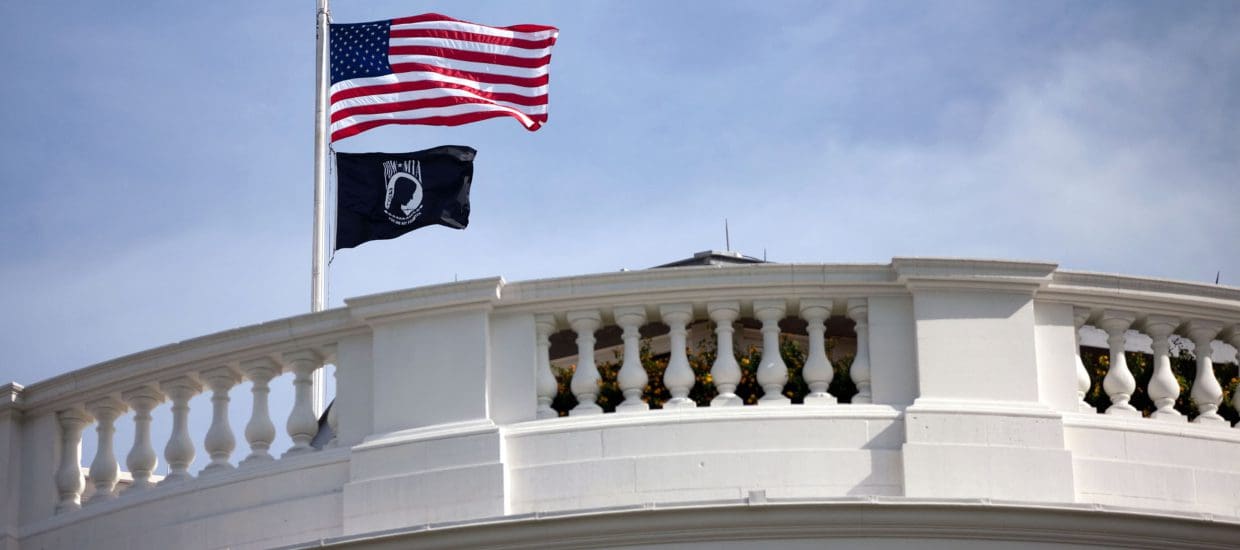Search Posts
Recent Posts
- Writer Herb Weiss’ 45 years of Advocacy on Aging now Archived at Rhode Island College Library Special Collection June 23, 2025
- Providence Biopharma, Ocean Biomedical, Notified of Termination of License Agreements with Brown University, RI Hospital June 23, 2025
- Networking Pick of the Week: Early Birds at the East Bay Chamber, Warren, RI June 23, 2025
- Business Monday: Dealing with Black and White Thinking – Mary T. O’Sullivan June 23, 2025
- Rhode Island Weather for June 23, 2025 – Jack Donnelly June 23, 2025
Categories
Subscribe!
Thanks for subscribing! Please check your email for further instructions.

One Bipartisan Success in DC Just in Time for Veterans Day
President Trump has signed into law the National POW/MIA Flag Act. Cosponsored by U.S. Senators Elizabeth Warren (D-MA), Tom Cotton (D-AR), Jack Reed (D-RI), and several others, the law will require the POW/MIA flag to be displayed whenever the American flag is displayed on prominent federal buildings and national war memorials to honor the more than 82,000 Americans who are listed as Prisoners of War (POW), Missing in Action (MIA), or otherwise unaccounted for from our nation’s past wars and conflicts.
Displaying the POW/MIA flag year-round will help ensure that neither the federal government, nor the public, forgets about those who did not return home from war.
The iconic black and white POW/MIA flag was created in 1972 and features the silhouette of a soldier’s head, a guarded watch tower, barbed wire, wreath, and the words “POW MIA — You Are Not Forgotten.”
“As the sister of three veterans, I understand the importance of honoring the sacrifices of those who have fought courageously for our country,” said Senator Warren. “This bipartisan law ensures that the POW/MIA flag is consistently and prominently displayed and that we never forget those servicemembers who have not returned home.”
“There’s no better time than Veterans Day to honor those who left our shores only to be held captive, and those who have still not returned,” said Senator Cotton. “Over 82,000 Americans remain missing from past wars and prominently displaying the POW/MIA flag will help remind all Americans of their service and sacrifice.”
“This is about honoring U.S. service members who were prisoners of war or those missing in action, and ensuring they remain front and center in our collective hearts. We can never repay our profound debt to them, but we should recognize their service each and every day. And we must support their families and uphold the American values they fought so hard to defend,” said Senator Reed.
The National POW/MIA Flag Act
The National POW/MIA Flag Act will ensure that the POW/MIA flag is displayed whenever the American flag is displayed, effectively ensuring that both flags are displayed concurrently and every day at federal locations already designated under existing law. Those locations include the U.S. Capitol, the White House, the World War II Memorial, the Korean War Veterans Memorial, the Vietnam Veterans Memorial, every national cemetery, the buildings containing the official offices of the Secretaries of State, Defense, and Veterans Affairs, the office of the Director of the Selective Service System, each major military installation (as designated by the Secretary of Defense), each Department of Veterans Affairs medical center, and each United States Postal Service post office.
Prior to enactment of this law, the POW/MIA flag was required to be displayed by the federal government on certain prominent federal properties only six days per year: Armed Forces Day, Memorial Day, Flag Day, Independence Day, National POW/MIA Recognition Day, and Veterans Day.
“The POW/MIA flag flying over the Capitol, the White House, and other important federal properties will be a reminder to the families of our missing and the public that our government has not forgotten the 82,000 POW/MIAs unaccounted for from all wars who did not come home,” said Augustus Dante, Government Affairs Liaison of the Rolling Thunder, Inc.
On the House side, the National POW/MIA Flag Act was led by Representatives Chris Pappas (D-NH)and Jack Bergman (R-MI). The legislation had the support of Rolling Thunder, Inc.; the National League of POW/MIA Families; Veterans of Foreign Wars; The American Legion; American Ex-Prisoners of War; and the National Alliance of Families for the Return of America’s Missing Servicemen.
